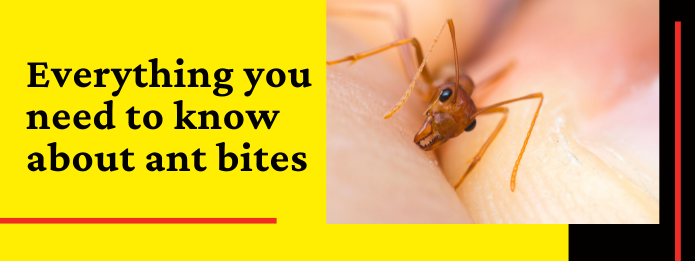Cambridge Pest Removal: Everything You Need To Know About Ant Bites

Ant bites are a matter of moderate concern if you have an infestation in your home. On the one hand, most ant species rarely bite, and there are other issues associated with an infestation that makes ant removal more urgent. However, if ants do bite, it can be very unpleasant. If you ever do experience an ant bite, here is what you need to know.
What Ant Species Are Known To Bite?
One ant species is specifically known for biting and stinging humans: the fire ant. In the case of the fire ant, the bite is not actually what causes symptoms. A fire ant latches onto the skin with its jaws to get a good grip and then stings several times with a stinger embedded in its abdomen, similar to a wasp. The sting injects venom which causes a painful skin reaction. Fortunately, fire ants do not live in Canada. They originated in South America and are also found in the southern portion of the United States, reportedly after being imported in cargo ships during the 1930s.
While ant species in Canada do not sting like fire ants, they may bite. If you ever get a good look at a carpenter ant, one of the largest ant species, you can see their large and formidable mandibles. These are intended for chewing through wood, but if a carpenter ant decides to bite you, it can cause quite a pinch and may even break the skin. Ants may also spray a naturally occurring chemical called formic acid into the wound left by the bite to irritate it. Some ants just spray formic acid without biting. When it comes in contact with the skin, formic acid can cause a painful burning sensation.
Why Do Ants Bite?
Biting, stinging, and spraying formic acid are all defensive capabilities of ants. Whichever method they use, they do not use it for no reason. Ants only bite when they feel threatened. If you handle an ant or disturb an ants’ nest, they are likely to retaliate by using whatever defensive capability is available to them. If you keep your distance from ants, they are likely to leave you alone.
The problem arises when you are not aware of an ants’ nest nearby. The ants may feel threatened and start biting, stinging, or spraying. The defensive capabilities of a colony of ants are one reason why you should consider hiring professional pest control in Cambridge to deal with it should you discover one in or near your home.
What Do Ant Bites Look Like?
A skin reaction is usually localized to the area where the bite or sting took place. There is typically a small red area that is raised and swollen, usually 5 centimetres or less in diameter. This is red and painful. The local reaction can cover an area greater than 10 centimetres from the site. A large local reaction like this is typically marked by swelling, pain, itching, redness, and blistering. Rarely, an ant bite may produce a systemic reaction involving the gastrointestinal or respiratory systems. Systemic reactions can range from mild to severe.
How Do You Treat an Ant Bite?
A person having a severe systemic reaction to an ant bite needs to go to the emergency room. Otherwise, treatment for a local reaction may include the following:
- Cold compresses
- Analgesic medication, e.g., Tylenol
- Topical corticosteroids
If the reaction is large or slow to resolve, a doctor may prescribe oral corticosteroids.
What Should You Do About Ant Removal?
While the risk of ant bites is relatively low, an infestation can cause other problems. You should call Truly Nolen for pest control in Cambridge right away if you discover an ants’ nest in your home. We can help you identify the kind of ant and recommend a safe solution.